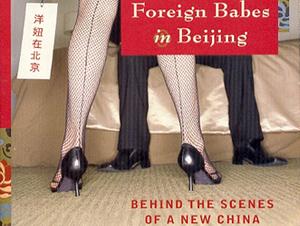‘Foreign Babes in Beijing’
The following is not a full transcript; for full story, listen to audio.
The soap opera, “Foreign Babes in Beijing” was one of China’s most popular TV shows in the 1990s, with an audience of 600 million viewers.
American Rachel DeWoskin starred as the American vixen, “Jiexi” on the show. She’s written about her experiences as a soap opera character and as a real-life American living in China in a book, also called “Foreign Babes in Beijing.”
Originally from Ann Arbor, Michigan, DeWoskin had been living in Beijing and working for a PR firm when, at a party, a producer approached her about the role.
“I met a guy at a party who said, ‘you’re white, do you want to be in my friend’s soap opera?’ And I said ‘no’ because I was working 22-hour days and pushing two chairs together in the office at night to sleep and wake up and work again.
“But the more that my corporate job snaked out hideously on the horizon, the more I thought it would be interesting to go see the studio with this guy.”
DeWoskin says the show was standard soap opera fare. She played one of the two “foreign babes,” American students in Beijing. Her character was the bad girl who falls in love with a married, Chinese man. In the end however, her character is redeemed as she sacrifices everything for true love.
“In fact, we both sacrifice everything for true love. Louisa, the good girl, marries her innocent … Chinese boyfriend in a virgin wedding, and then lives in China and acculturates. She becomes the kind of princess of a daughter-in-law that every Chinese family dreams of. She rolls dumplings and bares them a grandson in the last episode.
“Jiexi, my character, falls in love with the arty, married brother, seduces him and takes him back to the West. But the final scene is a happy scene of exodus. There are pigeons flying above and his parents are cry out loving things to me, and I call them ‘mother’ and ‘father,’ and then we go to America.
“And in a way, I think it’s ideal for the ‘Lee’ family to have one son stay in China and to take care of them, and one son move to the West and enjoy great wealth.”
In her book, DeWoskin describes the show as a Chinese view of an American’s life in China, which she says was sometimes outrageous and sometimes accurate.
“My life in Beijing was interesting precisely because I played Jiexi. I had this dual life. On the one hand I was in fact a foreign woman living in Beijing, and simultaneously I was playing the Chinese idea of my life on television. And the two contradicted each other and sometimes overlapped in ways that really surprised me.
“For one thing, they teased my hair and dressed me in jewelry and fur coats. I looked like a Dallas re-run from the 1980s. And on the other hand, some of the relationships they tried to tease out on the show, and some of the complexity of it reminded me very much, if not of my own life there, then of my best American friend’s life there. Her name is Kate, and she’s this blonde journalist who was in love with Chinese culture and in love with Chinese men, and she often said to me ‘”Foreign Babes in Beijing” is the story of my life.'”
DeWoskin believes there are larger social themes that the show embodied, one of which is the allure and dangers of Western encounters.
“China has always used sex as a metaphor to describe moral encounters with the outside world. There’s of course the infamous Rape of Nanking, and there’s the draining of Chinese men’s virility in terms of the Opium Wars. And so I think sex as a metaphor for moral encounter or for military encounter with the West is a tried-and-true theme in China.
“And I think Jiexi and Louisa are seducing China in a sense. We come in and we seduce China’s best men, these unbelievably gorgeous, chiseled Chinese soap opera actors. And in way it creates a fantasy that turns the table on Hollywood depictions of Chinese men as Charlie Chans or inscrutable Orientals or Asian house boys. And Western women relieve Eastern women momentarily of the chore of being exotic.”
——————————————————-
“To the Best of Our Knowledge” is an audio magazine of ideas – two hours of smart, entertaining radio for people with curious minds.
